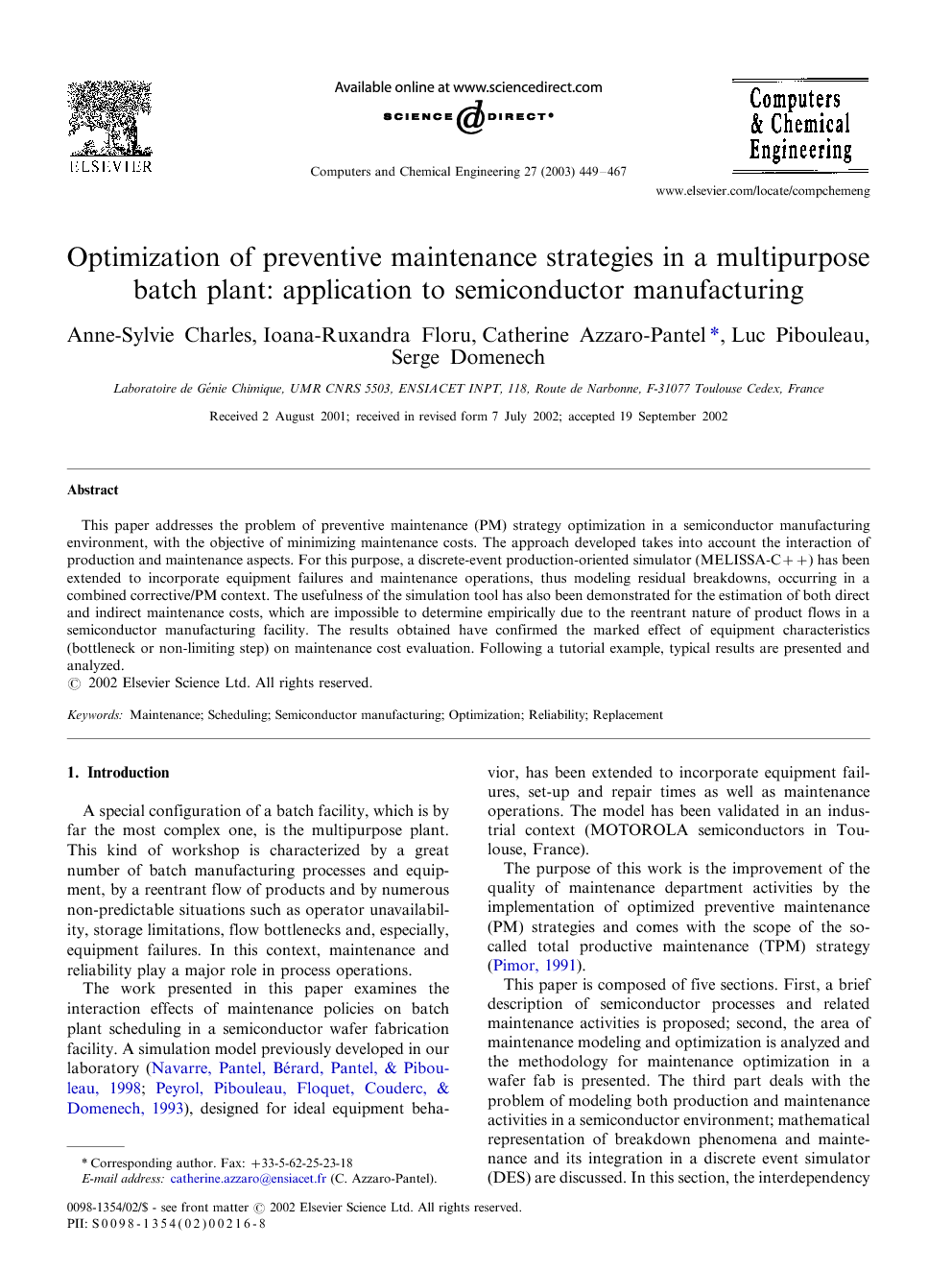This paper addresses the problem of preventive maintenance (PM) strategy optimization in a semiconductor manufacturing environment, with the objective of minimizing maintenance costs. The approach developed takes into account the interaction of production and maintenance aspects. For this purpose, a discrete-event production-oriented simulator (MELISSA-C++) has been extended to incorporate equipment failures and maintenance operations, thus modeling residual breakdowns, occurring in a combined corrective/PM context. The usefulness of the simulation tool has also been demonstrated for the estimation of both direct and indirect maintenance costs, which are impossible to determine empirically due to the reentrant nature of product flows in a semiconductor manufacturing facility. The results obtained have confirmed the marked effect of equipment characteristics (bottleneck or non-limiting step) on maintenance cost evaluation. Following a tutorial example, typical results are presented and analyzed.
A special configuration of a batch facility, which is by far the most complex one, is the multipurpose plant. This kind of workshop is characterized by a great number of batch manufacturing processes and equipment, by a reentrant flow of products and by numerous non-predictable situations such as operator unavailability, storage limitations, flow bottlenecks and, especially, equipment failures. In this context, maintenance and reliability play a major role in process operations.
The work presented in this paper examines the interaction effects of maintenance policies on batch plant scheduling in a semiconductor wafer fabrication facility. A simulation model previously developed in our laboratory (Navarre, Pantel, Bérard, Pantel, & Pibouleau, 1998; Peyrol, Pibouleau, Floquet, Couderc, & Domenech, 1993), designed for ideal equipment behavior, has been extended to incorporate equipment failures, set-up and repair times as well as maintenance operations. The model has been validated in an industrial context (MOTOROLA semiconductors in Toulouse, France).
The purpose of this work is the improvement of the quality of maintenance department activities by the implementation of optimized preventive maintenance (PM) strategies and comes with the scope of the so-called total productive maintenance (TPM) strategy (Pimor, 1991).
This paper is composed of five sections. First, a brief description of semiconductor processes and related maintenance activities is proposed; second, the area of maintenance modeling and optimization is analyzed and the methodology for maintenance optimization in a wafer fab is presented. The third part deals with the problem of modeling both production and maintenance activities in a semiconductor environment; mathematical representation of breakdown phenomena and maintenance and its integration in a discrete event simulator (DES) are discussed. In this section, the interdependency between preventive and corrective actions is widely presented. Typical results obtained by the simulation tool are analyzed. The next section is devoted to the methodology for determination of optimal PM frequency for equipment. General considerations about maintenance costs are also presented. Finally, conclusions and perspectives are suggested.
In this paper, we have attempted to demonstrate the importance of scheduling consideration in the optimization of PM strategies in a semiconductor manufacturing environment. For this purpose, the MELISSA-C++ object-oriented simulator has proven to be an efficient tool, especially for modeling the interaction effects between production and maintenance. Its interest has also been widely shown for modeling residual breakdowns, which still occur in a combined corrective/PM context. Moreover, MELISSA-C++ has a huge importance for evaluating qualitatively direct and above all, indirect maintenance costs. More precisely, the results performed for the didactic workshop have confirmed the marked effect of equipment characteristics (bottleneck or non-limiting step). This feature can easily be identified via computation of the OEE indicator by MELISSA-C++. Note also that these costs are practically impossible to determine empirically due to the reentrant nature of product flows in a wafer fab.
Then, a methodology has been proposed to define the optimal PM frequency for equipment.
Although a prototype semiconductor manufacturing workshop serves as a test bench for illustrating the approach, it must be yet emphasized that the proposed methodology can easily be transposed to other multipurpose batch plants.
This study has clearly shown that the methodology applied for equipment considered as a unique system leads to a marked improvement in production yield and maintenance costs, even if it has been achieved equipment by equipment. The approach has also been generalized to equipment as a multi-unit system and the results obtained will be presented elsewhere.
Future works will now be devoted to the implementation of a global optimization procedure for an overall improvement of workshop productivity.
Further investigations will also concern the development of a more systematic optimization tool taking into account, with respect to technical and organizational constraints, the interaction between the algorithm proposed for optimal PM frequency and MELISSA-C++.


